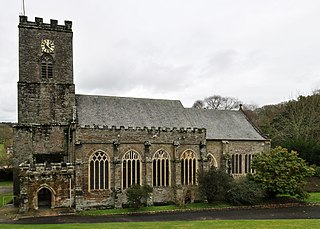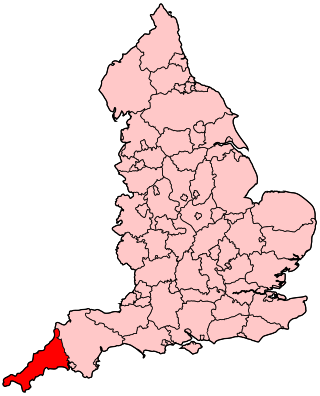
Truro is a cathedral city and civil parish in Cornwall, England; it is the southernmost city in the United Kingdom, just under 232 miles (373 km) west-south-west of Charing Cross in London. It is Cornwall's county town, sole city and a centre for administration, leisure and retail trading. Its population was 18,766 in the 2011 census. People of Truro can be called Truronians. It grew as a trade centre through its port and as a stannary town for tin mining. It became mainland Britain's southernmost city in 1876, with the founding of the Diocese of Truro. It is home to Cornwall Council, the Royal Cornwall Museum, Truro Cathedral, the Hall for Cornwall and Cornwall's Courts of Justice.

Penzance is a town, civil parish and port in the Penwith district of Cornwall, England, United Kingdom. It is the westernmost major town in Cornwall and is about 64 miles (103 km) west-southwest of Plymouth and 255 miles (410 km) west-southwest of London. Situated in the shelter of Mount's Bay, the town faces south-east onto the English Channel, is bordered to the west by the fishing port of Newlyn, to the north by the civil parish of Madron and to the east by the civil parish of Ludgvan. The civil parish includes the town of Newlyn and the villages of Mousehole, Paul, Gulval, and Heamoor. Granted various royal charters from 1512 onwards and incorporated on 9 May 1614, it has a population of 21,200.

Saint Austell is a town in Cornwall, England, United Kingdom, 10 miles (16 km) south of Bodmin and 30 miles (48 km) west of the border with Devon.

The Duchy of Cornwall is one of two royal duchies in England, the other being the Duchy of Lancaster. The eldest son of the reigning British monarch obtains possession of the duchy and the title of Duke of Cornwall at birth or when his parent succeeds to the throne, but may not sell assets for personal benefit and has limited rights and income while a minor.
Charles Gordon Henderson was a Cornish historian and antiquarian.

The Royal Cornwall Museum in Truro holds an extensive mineral collection rooted in Cornwall's mining and engineering heritage. The county's artistic heritage is reflected in the museum's art collection. Through the Courtney Library the museum also provides a collection of rare books and manuscripts to help with education, research and the discovery of Cornish life and culture.

Cornwall Council, known between 1889 and 2009 as Cornwall County Council, is the local authority which governs the non-metropolitan county of Cornwall in South West England. Since 2009 it has been a unitary authority, having taken over district-level functions when the county's districts were abolished. The non-metropolitan county of Cornwall is slightly smaller than the ceremonial county, which additionally includes the Isles of Scilly. The council is under no overall control since July 2024, when the Conservatives lost their majority. Its headquarters is Lys Kernow in Truro.

The Royal Cornwall Polytechnic Society is an educational, cultural and scientific charity, as well as a local arts and cinema venue, based in Falmouth, Cornwall, England, United Kingdom. The Society exists to promote innovation in the arts and sciences.
Gilbert Hunter Doble was an Anglican priest and Cornish historian and hagiographer.
St Kew is a village in Cornwall, England, United Kingdom. It is also the name of the civil parish, which includes the church town, St Kew, and nearby St Kew Highway.

Robert Were Fox FRS was a British geologist, natural philosopher and inventor. He is known mainly for his work on the temperature of the Earth and his construction of a compass to measure magnetic dip at sea.
Antony Charles Thomas, was a British historian and archaeologist who was Professor of Cornish Studies at Exeter University, and the first Director of the Institute of Cornish Studies, from 1971 until his retirement in 1991. He was recognised as a Bard of the Cornish Gorseth with the name Gwas Godhyan in 1953.

The National Maritime Museum, Cornwall is located in a harbourside building at Falmouth in Cornwall, England. The building was designed by architect M. J. Long, following an architectural design competition managed by RIBA Competitions.

Philip Rashleigh of Menabilly, Cornwall, was an antiquary and Fellow of the Royal Society and a Cornish squire. He collected and published the Trewhiddle Hoard of Anglo-Saxon treasure, which still gives its name to the "Trewhiddle style" of 9th century decoration.
Walter Hawken Tregellas was a British writer of historical, biographical and other works. He was also a professional draughtsman.

Christianity in Cornwall began in the 4th or 5th century AD when Western Christianity was introduced as in the rest of Roman Britain. Over time it became the official religion, superseding previous Celtic and Roman practices. Early Christianity in Cornwall was spread largely by the saints, including Saint Piran, the patron of the county. Cornwall, like other parts of Britain, is sometimes associated with the distinct collection of practices known as Celtic Christianity but was always in communion with the wider Catholic Church. The Cornish saints are commemorated in legends, churches and placenames.
William Hals (1655–1737) was a Cornish historian who compiled a History of Cornwall, the first work of any magnitude that was printed in Cornwall. He was born at Tresawsan, in the parish of Merther in Cornwall. Much of his work was never published but was used by other Cornish historians, including Davies Gilbert, Thomas Tonkin, and John Whitaker. Some of his original work is now held by the British Library.

The following outline is provided as an overview of and topical guide to Cornwall: Cornwall – ceremonial county and unitary authority area of England within the United Kingdom. Cornwall is a peninsula bordered to the north and west by the Celtic Sea, to the south by the English Channel, and to the east by the county of Devon, over the River Tamar. Cornwall is also a royal duchy of the United Kingdom. It has an estimated population of half a million and it has its own distinctive history and culture.
Presented below is an alphabetical index of articles related to Cornwall:

The Courtney Library is the library of the Royal Institution of Cornwall. It is housed in the Royal Cornwall Museum in Truro, Cornwall.














